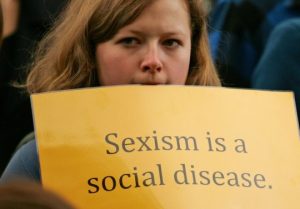It’s no secret that there are significant stereotypes reinforced and institutionalized through the modern media. Stereotypes like women being less qualified to be successful, or receive accolades for their work, are so ingrained in the media that they become solidified as prejudices in society. These prejudices become a factor that everyday people, in this case women, have to live according to in modern society. Even high profile celebrities end up being affected by these standards: including Academy Award winning Barbra Streisand.
Sexism is defined as “institutional practices (even if not motivated by prejudice) that subordinate people of a given sex (Myers 2015).” Barbra Streisand, one of the best-selling musical artists of all time, has publicly expressed that being a woman has “cost her multiple Oscar nominations over the years (Reynolds 2017),” and thus making her a victim of blatant sexism. Streisand claims that there was a significant number of “older people” that has no desire to see a woman director, including other women (Reynolds 2017). In this situation, it is a sexist stereotype that women are unqualified to direct that evolved into what exists today: a prejudice that says women should not be directors.
In their study on the nature of sexism, Tadios Chisango, Thokozile Mayekiso, and Manuela Thomae examine how two different elements of sexism, benevolent sexism and hostile sexism, manifest themselves in society, as well as how they are treated by the perceivers. Through examining sexism as a whole, we come to the idea that it is a mix of “benevolent sexism (‘Women have a superior moral sensibility’) with hostile sexism (‘Once a man commits, she puts him on a tight leash’) (Myers 2015).” In modern society, Chisango et. al. find that people react very differently towards each form of sexism:
“On the basis of the above findings, which have revealed widespread endorsement of BS [benevolent sexism] but rejection of HS [hostile sexism] across many different cultures by both genders in slightly varying degrees, we reasoned that expression of BS and enacting of related behaviour is more likely to occur in public than private contexts (as a function of social approval); on the other hand, expression of HS and enactment of related behaviour would be more likely to occur in private than public contexts (as a function of social disapproval) (Chisango et. al., 2015).”
This is where we can see the exact thing that is happening to Barbra Streisand when she is snuffed of her awards. Because the idea that women should not be directors is consistent with the attitudes of hostile sexism, we see that the actual disapproval is hidden under the covers of “The Academy,” where people remain relatively anonymous in an attempt to avoid public disapproval of their sexist view. However, when Streisand exposes the situation in the light to the light of the media, the social disapproval of a hostile sexist attitude comes in the outcry of the public for justice, and a change of values on the part of The Academy.
– Matt B.


